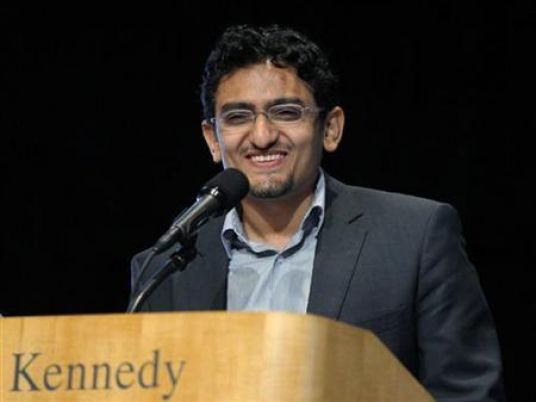
A handful of minor international celebrities have risen out of the uprising that heaved through the country a year ago, but few have captured the imagination of a media hungry for the perfect revolutionary narrative like Wael Ghonim has. The Google marketing executive anonymously administered the “Kullena Khaled Said” (“We Are All Khaled Said”) Facebook group that helped mobilize mass protests on 25 January 2011, was later arrested, and the tearful television interview he gave on his release infused a new jolt of energy into the crowds demanding Mubarak’s resignation.
The allure of a revolution begun and sustained by social media has long seduced worldwide media, and in this context Ghonim’s story provides a perfect foothold in a movement that even now is hard to grasp. So it is no surprise that in May of last year he was offered US$2 million to write a book about his experience as techie-turned-revolutionary. But as Ghonim writes in the acknowledgements to “Revolution 2.0,” which was published on 17 January, “When I was told this book had to be written in four months in order for it to be published on January 25, 2012 … I thought it was an impossible feat.”
As with most cultural production surrounding the 25 January revolution, “Revolution 2.0” is a project pushed forward to come out at an advantageous moment, to capitalize on huge international and local interest. To his credit, Ghonim sticks closely to his own personal experience, making little effort to speak more broadly about what happened or is happening in Egypt, besides voicing his deep love for and confidence in the Egyptian people. Inherently, projects like “Revolution 2.0” are not set up to provide reflection — what insight can we really expect from a book written in four months, started four months after the revolution began? Ghonim wrote his book as a sit-in in July held the square for a month, as military ran trucks over protestors in front of Maspero, as street battles raged on Mohammed Mahmoud and Qasr al-Aini streets in November and December, as the military erected concrete walls all around Tahrir Square.
But the flaws in such projects have been pointed out many times in these pages, and Ghonim’s book actually gives quite a bit of insight into exactly what he knows more about than anyone else — namely, how he steered his carefully monitored Facebook group to incrementally unite disconnected, disenfranchised, discontented young people at first against the arbitrary violence of the police and security forces, and eventually against the entirety of the Mubarak regime.
While one New York Times interviewer recently referred to him absurdly as “something of an Egyptian Che Guevara,” Ghonim describes himself as a “real-life introvert yet an Internet extrovert,” who conducts a large amount of his social life online (he even found his wife through an online forum). He dreamed of working for Google, and made it there through his experience as an early internet obsessive, armed with a business degree in marketing from the American University in Cairo and a knack for fostering online communities.
“Kullena Khaled Said” was not Ghonim’s first foray into community building on the internet. He created a social website for Muslims called IslamWay that he eventually sold to an American Muslim charity, and administered the unofficial Facebook page for Mohammed ElBaradei’s presidential campaign, before Said’s brutal murder in 2010 spurred him to create “Kullena Khaled Said.” From the beginning Ghonim strove to be the anti-activist; his rhetoric was never abrasive, never ideological. Relying on his marketing training, he carefully tailored the tone and content of the group not to alienate, but be personal and inviting.
Ghonim writes, “‘Kullena Khaled Said’ spoke the language of the Internet generation. The tone on the page was always decent and nonconfrontational.”
Later, he makes more explicit reference to marketing strategy, writing, “This wasn’t going to be too different from using the ‘sales tunnel’ approach that I had learned at school. The first phase was to convince people to join the page and read its posts. The second was to convince them to start interacting with the content…. The third was to get them to participate….The fourth and final phase would occur when people decided to take the activism onto the street.”
It is a testament to the strength of such strategies, and Ghonim’s mastery of them, that it worked — and worked well. The group had hundreds of thousands of members by 25 January, 2011, and did indeed help translate online solidarity into real-life mass demonstration.
“Revolution 2.0” gives the impression that what happened on 25 January was spurred mostly by “Kullena Khaled Said,” one element in a powerful confluence of events. This is as likely intentional as it is simply a testament to Ghonim’s individual experience of those days. But despite his constant reminders that the revolution had no leader and that he himself does not want to be a leader, he clearly relished his position as the “admin” shrouded in mystery, an “anonymous sentinel who tries to wake up the people around him,” and has a sense of the cinematic grandeur of his personal story. He writes of his cab ride to the airport in Dubai to catch a plane to Egypt on the eve of 25 January, “I played and replayed Hans Zimmer’s soundtrack from the movie ‘Inception.’ The experience was emotional, with the car cutting through the night with suspenseful music playing in the background.”
Ghonim’s detailed account of the Facebook group’s gradual growth is the most enlightening part in the book. His personal backstory is mundane, and his experience of the actual 18 days of uprising limited. Because he was in prison for most of this time, but is nonetheless obliged to provide a narrative of what was happening, his account of 28 January – 6 February is the same as you might find in any ten-minute documentary summary of the events. When he is released, his naiveté in the face of real-life political maneuvering is clear. He is quickly duped into making a short-lived, convoluted deal with National Democratic Party leader Hossam Badrawy in which Mubarak would resign but remain on “honorary” status in Egypt.
Despite the broad support he had when he gave his now-famous interview with TV host Mona El Shazly after his release, Ghonim has since become a controversial figure in Egypt, largely because of this demonstrated willingness to compromise, as well as his position as a western media darling. (As Egypt Independent reporter Sarah Carr tweeted on 23 January, “And the Lord Said, a year after the Glorious Upheaval in the Land of Egypt, foreigners will Write abt Ghonim Non-stopeth.”)
Though unlikely to be a classic, “Revolution 2.0” gives a detailed account of what inspired the t-shirts that join three iconic words — “Tahrir, Freedom, Facebook” — and will probably be a helpful reference for anyone who wants to build up mass internet support in the future. Ghonim can be faulted for latently accepting his western media anointed position as a leader, for making ill-advised backroom deals, for not sticking around but writing a book instead, yet in the end he is simply who he has always been: a Google marketer with a very useful skill set and a straightforward but overwhelming desire to see his country improve.



